Andrew here with a final Emmy tribute before the Emmy Awards are announced tonight.
When we tallied our lists of favourite nominees it was Outstanding Actress in a Drama Series which was the most mentioned category and since all Film Experience writers and readers love actresses we devoted a special post to the category. In a few hours the category will see a new winner that will be historic in some way - a win to put Claire Danes among the most feted in this category? A rare win for a sci-fi show? A win for the first Black actress in this category? The first acting win for Mad Men or the first win in a non-guest category for a Netflix show? Although popular vote will eventual coalesce among a single performer, each of these women in their submission reveals something special in their performances worth remembering. And, so, as a tribute to this talented sextet, our writers take a look at each of the nominees.
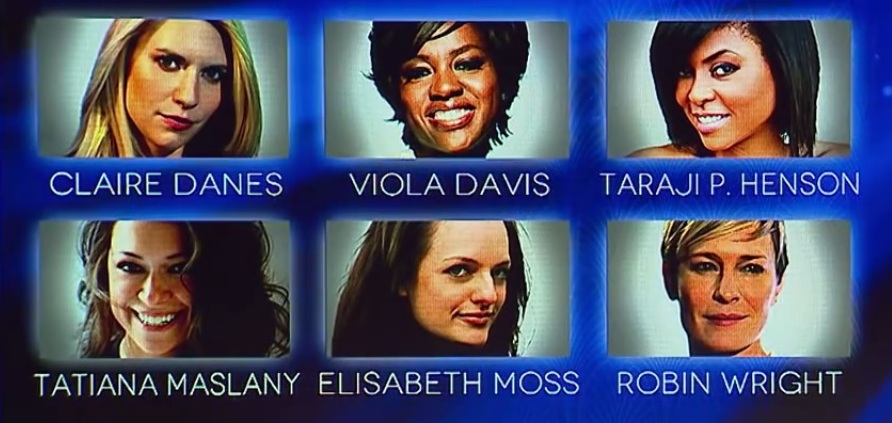
THE NOMINEES
CLAIRE DANES in Homeland as Carrie Mathison ("From A to B and Back Again")
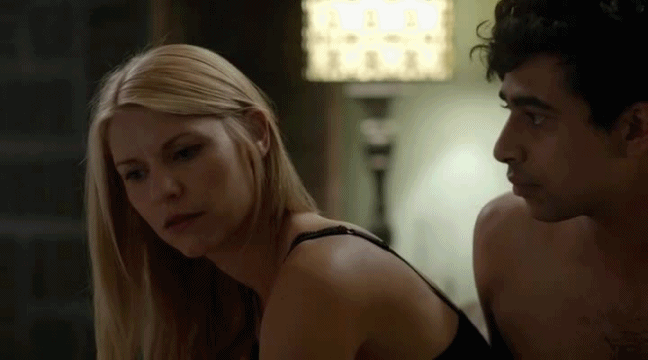
(16 minutes or 36% of the episode)
Claire is, perhaps, the woman least likely to win this award just for the fact that the category is so filled with phenomenal woman and Homeland is not the sort of beloved show that will see her winning a third statue but even as she has about 16 minutes of screen time the performance is a forceful representation of why Carrie Mathison, and Danes portrayal of her, remains one of TV’s most essential turns. The episode opens on her in bed with a young Pakistani, the nephew of a highly sought terrorist. She’s playing him, pretending to be his lover to get closer to his terrorist. Except, Carrie is so difficult to read, we’re never sure how much of her interaction with Aayan is sincere and how much is fictitious. The beauty of the performance is in its deliberate evasiveness and opaqueness. Alex Gansa’s script never gives her a tongue-in-cheek monologue to express her feelings so Claire must telegraph her embarrassment, regret, guilt, aguish with just her face. The episode’s climax comes when the recruit is gunned down by his uncle as he reveals he’s kidnapped Carrie’s former boss. In typical Homeland fashion the moral lines are blurred as Carrie insists they get a drone to blow up the vehicle of the departing terrorist, Saul's not withstanding. The episode avoids convention by closing with no cathartic moment where we see things from Carrie’s perspective or see her weakened, instead it ends on frustration – a woman unravelling feeling myriad feelings all at once. It’s always been Carrie Mathison’s dilemma, overwhelmed with emotion that often threatens to fell her. It’s one of the reason’s Homeland’s fourth season has been so thrilling pushing in darker and thornier places and it’s why Danes performance has been the centre of that. She won’t win the Emmy but that’s an incidental footnote in the genesis of this performance. It’s deep, corrosive, intelligent work the type of performance layered with emotion that reveals greater gradations each time you watch. (ANDREW)
VIOLA DAVIS in How to Get Away With Murder as Annalise Keating ("Whack-A-Mole")
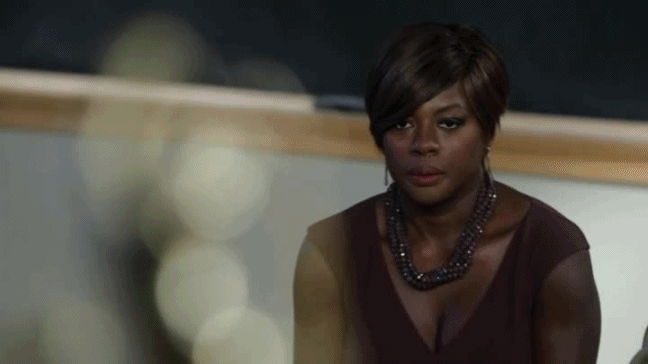
TARAJI P. HENSON in Empire as Cookie Lyon ("Pilot)
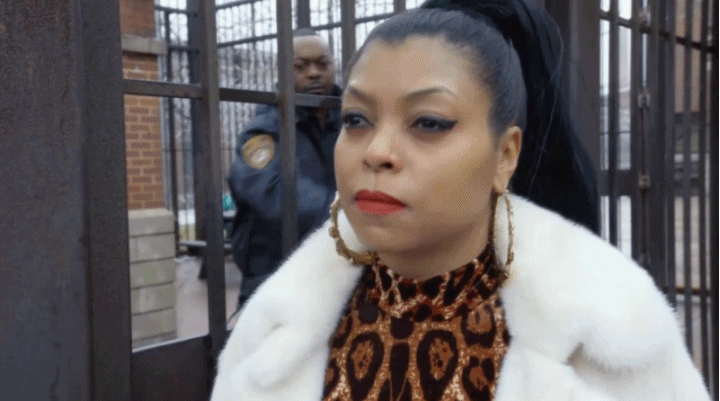
(14 minutes or 31% of the episode)
Despite receiving a Best Supporting Actress Oscar nomination for 2008’s The Curious Case of Benjamin Button and previous acclaimed work in television and film, it’s safe to say that with her breakout role as the delightfully gonzo matriarch of the record label ruling Lyons clan in the ratings juggernaut Empire that Taraji P. Henson has had the kind of year that actresses wait their entire career for. And with this trash-talking, animal print-sporting badass, Henson throws herself into the role of Cookie so completely, surprising you with what she’ll say or do next, that it’s hard to imagine any other actress bringing her to life in quite the same way. She’s clearly having the time of her life and allows the audience to share in the delirious fun. Henson might have had more shocking moments in later episodes of the season, but in submitting the Pilot episode for her Emmy nom, she’s clearly letting the voters know that she had the character down from the very beginning, so in tune with Cookie that Henson apparently ad-libbed one of the show’s most memorable lines (“Boo Boo Kitty”), making it an instant internet sensation. Bursting on to the scene as she’s busted out of jail (“Cookie’s coming home”) and quickly establishing the complicated relationships she has with each of the main characters (combative with youngest son Hakeem, compassionate with middle son Jamal, and conniving with eldest Andre), she begins her power play to secure her place on top. But the limits of the Pilot episode never fully allows Henson to play anything as a dynamic as her fellow nominees in this category. In spending so much time introducing us to all the players, Henson is in a relatively small amount of the show’s run time. It’s entirely due to Henson’s charisma and energy that it makes it feel like she dominates the episode, forcing the Emmy voters to take notice. They were probably too afraid of what Cookie would do to them had they not nominated her… (ABSTEW)
TATIANA MASLANY in Orphan Black as Sarah, Alison, Helena, Cosima and Rachel ("Certain Agony of the Battlefield")

(20 minutes or 49% episode)
Maslany's work on Orphan Black is more than just the sum of multiple clones she plays. Three seasons in audiences for the show are so accustomed to the specific depth she brings to each of these women it seems hardly momentous. But, even as Maslany is just fulfilling the task required of her, it bears repeating how specific each of these women are in their foibles. As a submission, this episode pales in some ways because it features scant moments of the clones interacting (it’s always been a specific joy watching Maslany out-act herself), but the episode features key moments for Sarah, Rachel and Alison with appearances from Beth, Cosima and Helena. The greatness of her work here, is that, in typical Orphan Black fashion, no clone is on the same emotional level so while Cosima is playing in a romance, and Alison in some heightened farcical comedy Sarah is having intensely dramatic near death moments and Rachel is dealing with regret. As an Emmy submission that offers Tatiana a leg up not just playing multiple but playing multiple styles and techniques, showcasing so much of her range. Although she's in the greatest percentage of her episode, it's odd that Tatiana didn't submit an episode more focused on the clones instead of other characters but like her fellow nominees it’s highly possible Tatiana submitted more for a specific moment than general screen-time. The Paul/Sarah romance has always been an arc that has been polarizing but as it comes to an end in this episode Sarah’s real anguish at the denouement present some of Maslany’s finest work opposite Dylan Bruce. Will it be enough for the statue? Who knows? But this is a more than worthy submission. (ANDREW)
ELISABETH MOSS in Mad Men as Peggy Olson ("Person to Person")
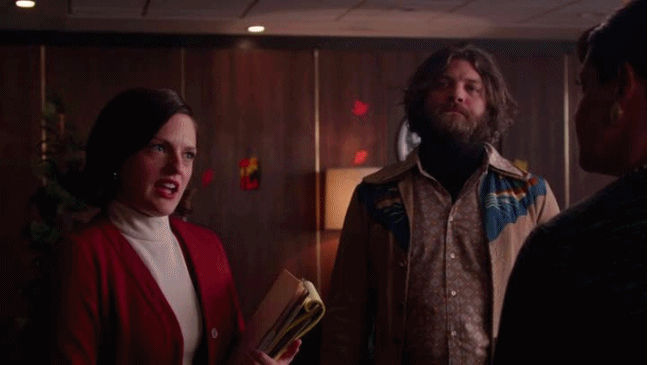
(9 minutes or 15 % episode)
The first time we see Peggy in "Person to Person" she's dressed like a Coca-Cola. Donning a blood red skirt and jacket combo that remind us how little she has advanced sartorially from the frumpy secretary we first met eight years ago...except now, she's in control. Her voice is being heard by the men she once feared, and as much as the first part of the episode tries to convince us she's extremely concerned about Don's vanishing, we know that Peggy has more important things to deal with. By the next time we run into her towards the end of the episode, she has become Don, she is sitting Draper-style with a cigarette in hand and a bottle next to her. "Get the door" she snaps at Stan. When she hears from Don later, she realizes she doesn't want to be him, she simply can't allow herself to be him. When she wisely suggest "I don't think you should be alone right now", she's speaking to Don as much as she is speaking to herself. Many were surprised by Peggy's "sudden" realization that she loved Stan, but Moss' pithy delivery - the things she does with her eyes, goddammit! - made us see that this was the first time Peggy had allowed herself to actually feel her feelings. It's a terribly unshowy performance, but from a very delicate emotional place she is able to convey an entire dramatic arch using as little flourishes as possible. Not only did Moss allow Peggy to be more efficient at dealing with the "can women have it all"-dilemma she was trying to express in an inefficient production of The Heidi Chronicles on Broadway; in less than nine minutes of screen time she also showed us all of Peggy's arch in the show. (JOSE)
ROBIN WRIGHT in House of Cards as First Lady Claire Underwood ("Chapter 32")
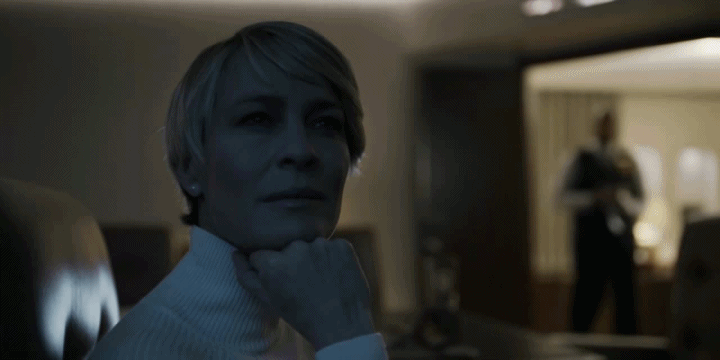
(21 minutes or 42% of the episode)
Claire Underwood stares out the window of Air Force One and gazes at the Northern Lights. A loving close up telling viewers who this episode is about. From then on she spars with the Russians, engages in philosophical discussion about marriage, politics and belief systems with the incarcerated American journalist she’s come to try and release, gets to be both tender and vile with her husband. All of this culminating in that big outburst at the press conference. It’s a great showcase episode that gets most of its strength from the simmering slow burn of emotions throughout. Wright never raises her voice, stays calm and then boom erupts in the final minutes with a righteous indignant speech delivered with fury, albeit measured. That her delivery is measured is the one obstacle that is preventing this from being a dynamite can’t lose submission. Viewers, and Emmy voters, probably have seen a lot of fiery speeches. This is different. It is however completely in character for Claire Underwood. The performance, in general and particularly in this episode, is a perfect mesh of character and actress. Wright doesn’t go for histrionics or unnecessary theatrics. She doesn’t lose the character thread just to showboat. Ultimately that’s probably why she won’t win. (MURTADA)
Who do you think submitted best? Who are you rooting for tonight?